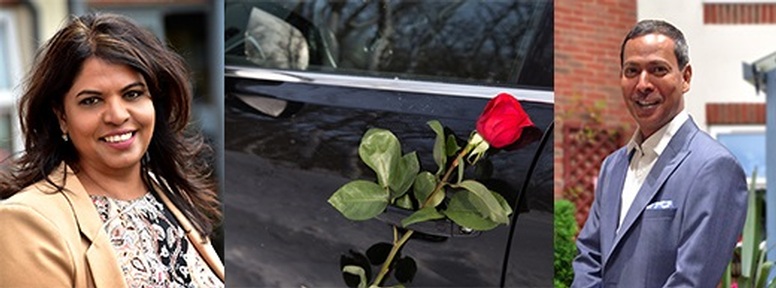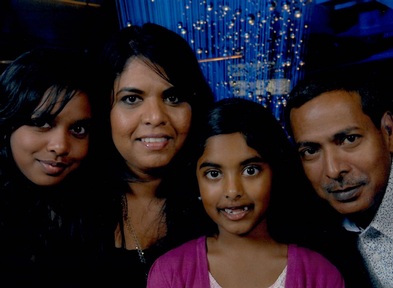Valentine heartbreak: Care home owner's husband never told her he'd 'months to live'
Valentine's Day doesn't get any easier for Patricia Sooriah, who lost her husband to cancer two years ago, however his legacy lives on in their care home, which has just been rated 'outstanding'. 
Patricia known as Trish, is a co-founder of Bank House Care Homes and describes the first time she met Kris - her husband and the group's co-founder.
“He asked me out on a date. I was 21 he was 25”, she says. "I’d never even been on a date before. He was my first boyfriend. First of everything!"
Kris Sooriah left his home in Mauritius to study nursing in the UK and was working at Royal London Hospital as a charge nurse, when he met the student nurse from Trinidad who would later be his wife.
'Kind, caring, ambitious'
“He was romantic. Very persistent. I came to UK from Trinidad with the intention of returning to my country. That didn’t happen! He was very kind, caring, ambitious.” Romance led to the couple marrying each other twice – once in England and again in Mauritius.
With his two brothers already running care homes, it wasn’t long before one asked Mr Sooriah to manage a care home. A year after the birth of their first daughter, the couple bought their first care home - Bank House in Nottinghamshire. “Any challenges he faces in life. He goes for it”, she says, and with echoes of their courtship, adds: ”Bank House was being sold - he pursued it.”
Bank House’s opening was followed by the purchase of more care homes including Ashcroft Care home in Sutton-in-Ashfield. He built from scratch a second care home on Ashcroft’s site, naming it Willowcroft. After leasing some care homes, Bank Care Homes eventually consisted of Ashcroft Care Home (bought in 2011) and Willowcroft (2014).
’Come now. Daddy’s poorly’
With two daughters and a growing care home business, Kris Sooriah took the lead in the care business, until a phone call proved to be a wake-up call. “My youngest daughter phoned me: 'Come now. Daddy’s poorly'."
Mr Sooriah was rushed to hospital. “He’d vomited up pints of blood. He needed an operation to stop the stomach bleed, otherwise he’d have bled to death.
“But Kris always downplays everything. He said: ‘I’ll be home for tea’.”
That was November 2016. A few days later, he went alone to see his GP and was told he had bone cancer.
He told her: “I’ve got to fight it.” Doctors told him he had four, maybe six months to live. But he never told his wife this.
“It was like Kris was preparing for battle. He started chemo, so I banned him from coming to the care homes, because he was more susceptible to getting infections."

Mrs Sooriah left care home managers in charge, while she stayed home to care for her husband. “He became very feeble. He couldn’t walk. He was in a lot of pain.
"He never talked about dying. I was in charge of quality monitoring at the business but I didn’t know the financial side. He probably thought, if he discussed it was like accepting his fate when he needed to fight it.”
‘Are you going to leave us?’
In February 2017, "doctors said ‘There’s nothing else we can try’". Doctors stopped his treatment that month. “I heard the term palliative care. I knew it well but I was in denial. We made such a good family, good husband, business partner. Two days after his 53rd birthday (on 12 April), her husband was admitted to hospital with an infection.
“He was not the Kris we knew. He was not responding to anyone. We just had a vigil around his bed." On Sunday (16 April), she got a call from the hospital and took the children to see their dad.
"I said 'Kris'. 'Are you going to leave us?' It was strange because he actually looked at me and answered. 'No. What are you talking about? I’m just tired. I’m going to sleep now. Wake me up later.' "
But relatives started playing hymns. The children were sobbing. “In our culture when someone is near death, you give them a drink.
“So I did. I said: ‘Ok you go to sleep, we’ll be alright.’ He literally let out a shallow breathe and died.”
In the months after, Mrs Sooriah thought: “What am I going to do? I wanted everything to be as normal as possible for the children. At first, I wanted to sell up."
’I didn’t want to be seen as the grieving widow’
“I didn’t want to rock the business. I didn’t want to be seen as the grieving widow. Like my children, I needed to give staff confidence in me at the time. I thought, I need to prove I can look after the business. For my kids, for Kris. I didn’t want standards to drop.”
She recalls: “Kris always used to say we should be audit ready every day. That gives you a different drive.”
A new care home manager Nikki Onyeneke was appointed at the 53-bed Ashcroft Care Home (rated ‘good’ in 2015). She also supported the care home manager at the 40-bed Willowcroft home.
Nikki Onyeneke says: “There was a lot of uncertainty in the air.” The previous manager left and not long after, half of the staff handed in their notice.
The care home manager says some new staff were hired who were flexible enough “to bend to suit residents’ changing needs and not the other way round”.
When it came to recording accidents, Ms Onyeneke would go through the accident book every day.
To reduce falls, she would visit each resident affected and risk assess the resident's chair, room, lighting, even footwear. If someone has lost weight, their slippers may become too big. To prevent another fall, staff would go out and buy new slippers, rather than wait for family to do it.
What Mrs Sooriah calls ‘care home cobra meetings’ were held with staff to work through issues. She says: “When he knew he was leaving us, Kris never showed a sad face. When I’m faced with any situation, staff conflict or something else, everything just seems like child’s play in comparison.”
Care Quality Commission inspectors rewarded Ashcroft Care Home’s efforts with the publication of an ‘outstanding’ report following an unannounced inspection on 25-26 October 2018.
"Oh my god! When the inspector phoned me to say we had ‘outstanding’, I just burst into tears!
“The first of everything happened last year. The first anniversary of his death, the first Valentine’s without him. He’d always buy me a present, send me flowers on Valentine’s. The pain doesn’t go away, missing him just gets deeper every day.”
Her loss is still raw but the care home's 'outstanding' report - published 17 January 2019 - means Trish Sooriah has one date this year she can smile about.
Latest Features News
 25-Nov-19
2019 Election: Boris Johnson leaves social care in 'too difficult box' but Labour vows to end 'crisis'
25-Nov-19
2019 Election: Boris Johnson leaves social care in 'too difficult box' but Labour vows to end 'crisis'
 18-Oct-19
Podcast: Wendy Mitchell and dementia: 'My biggest fear is not knowing who my daughters are'
18-Oct-19
Podcast: Wendy Mitchell and dementia: 'My biggest fear is not knowing who my daughters are'
 27-Sep-19
Exclusive: Care minister backs care workers' call for time off to grieve and attend funerals
27-Sep-19
Exclusive: Care minister backs care workers' call for time off to grieve and attend funerals
 19-Sep-19
Podcast: Gyles Brandreth says poetry helps ward off dementia
19-Sep-19
Podcast: Gyles Brandreth says poetry helps ward off dementia
 30-Aug-19
Edinburgh Fringe funnyman joins comics facing toughest audience at care home gig
30-Aug-19
Edinburgh Fringe funnyman joins comics facing toughest audience at care home gig